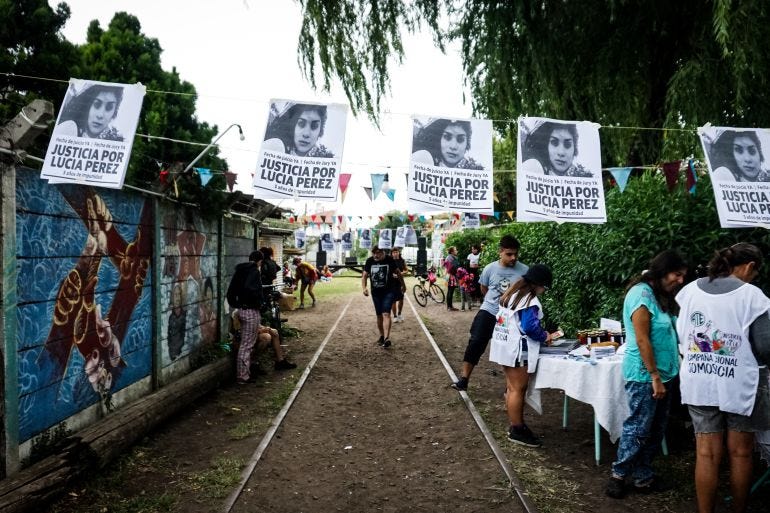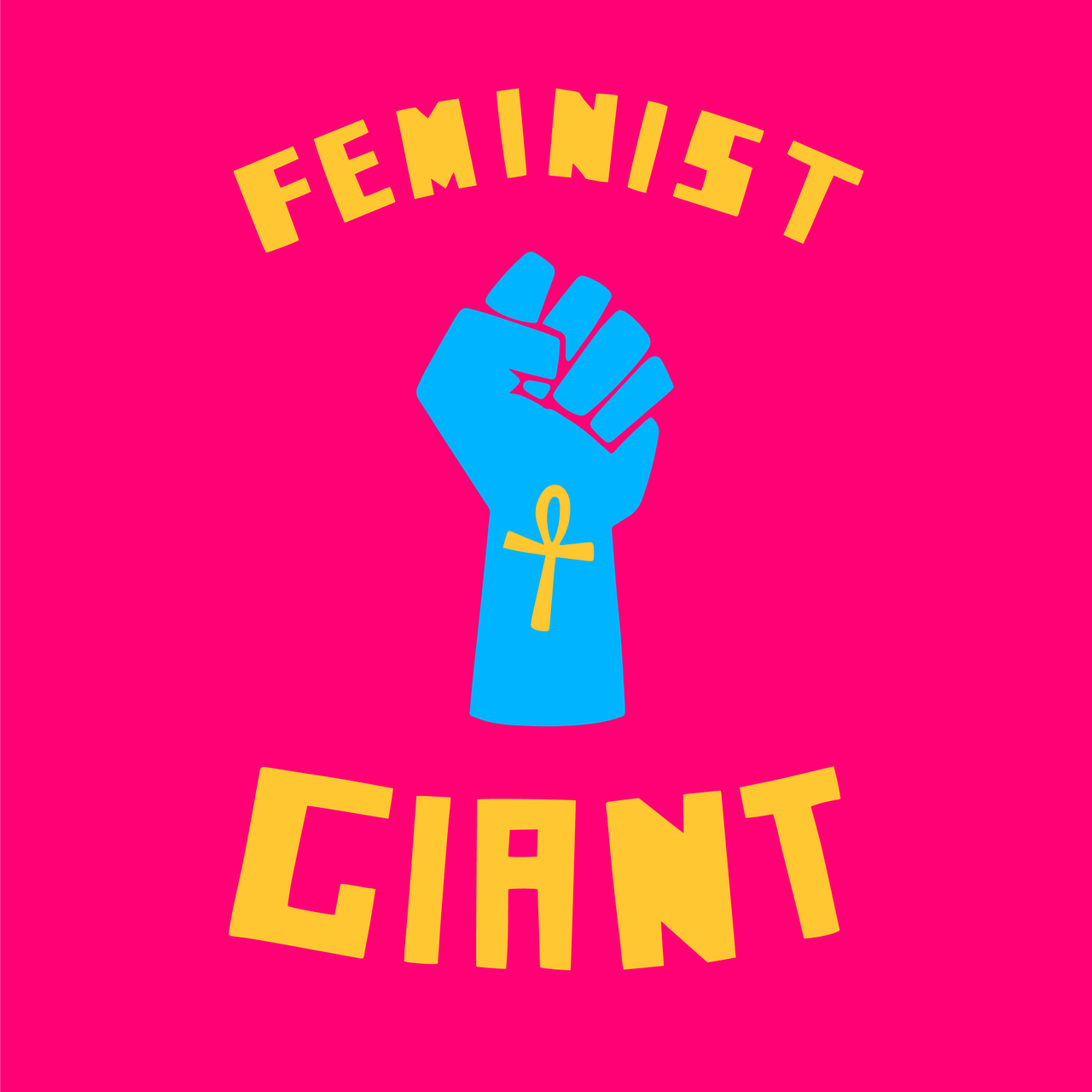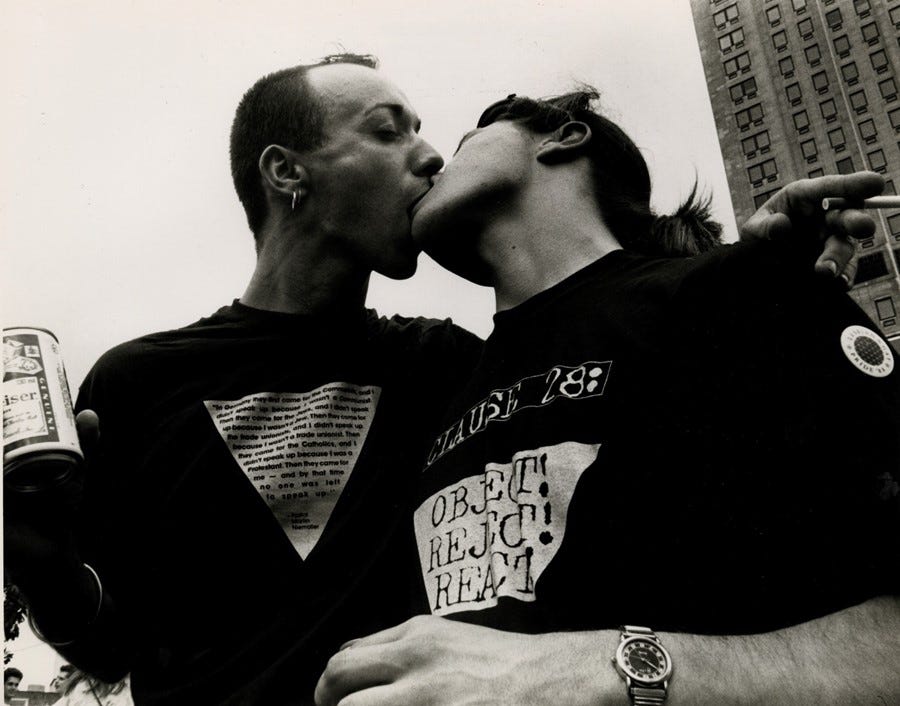Global Roundup: Ending Femicide in Argentina, Colombia Journalist & Land Defender, Instagram Account for Women in Science & Nature, Archiving LGBTQ+ History, Newcomer & Indigenous Women Self Defense
Curated by FG contributor Samiha Hossain
Supporters rallied around the family of Lucia Perez at an event to mark her birthday in Mar del Plata, Argentina, February 20, 2022 [Natalie Alcoba/Al Jazeera]
CW: gender-based violence
The teenage girl’s lifeless body was dropped off at a health clinic by two men, Matias Farias, 23, and Juan Pablo Offidani, 41. They were accused of drugging, raping and killing her – and Farias also faced a charge of femicide – but acquitted by a trio of judges who found them only guilty of administering drugs to a minor. The judges also absolved a third man who is now deceased of helping them cover up the crime.
In Argentina, one woman is killed roughly every 30 hours, a statistic that has not shifted much since a new wave of the feminist movement exploded onto the streets in 2015 under the banner Ni Una Menos (Not One Less). Lucia’s death prompted the first women’s strike, which saw hundreds of thousands of people demonstrate in the streets in 2016 demanding more action from legislators.
The movement of women has not only conquered the streets, but we are also conquering these spaces and we will use all tools that are available to us. This case could set an important precedent for us. - Maite Guerrero, lawyer with the Equipo Latinoamericano de Justicia y Genero
Human rights, legal, and feminist groups denounced the verdict, saying it judged the character of the victim, rather than the accused. Many believe the judiciary used gender stereotypes, as they argued that text message conversations made it “clear Lucia had sexual relations with whom and when she wanted,” and her “personality” and experience with older men meant she couldn’t have been subordinated in the encounter with Farias.
The ruling was quashed in 2020 by a higher court, and the family is still awaiting a new trial date to be set. They also are waiting for a hearing that could strip the original trial judges of their posts for relying on gender stereotypes and prejudices in their ruling. In 2021, the Magistrates Prosecution Jury announced that a hearing into the judges’ conduct would take place. A date has not yet been set. It suspended them immediately and docked their pay 40%.
Now, Lucia’s family waits – and continues its painstaking work. Lucia’s parents have started an NGO that tracks femicides and advocates for the victims. In February, dozens of people rallied around the family as local bands performed at an event in Mar del Plata to mark Lucia’s birthday.
We have had incredible support, not just in Mar del Plata but across the country. And we never stopped fighting. That’s very important. Not just that the family doesn’t stop fighting but that they believe in what they’re fighting for. It’s very important to believe in that daughter that you had. - Marta Montero, Lucia’s mother
Colombia’s five decades of civil war saw the rule of law collapse, with all parties to the conflict against civilians. The constant incursions of government forces, paramilitary groups and the guerrilla FARC made civilians vulnerable to many forms of violence. As the different forces drove farmers and indigenous communities off their lands, and destroyed their ecosystems, women bore the burden as the primary caregivers.
Sierra is a land and water rights defender, born into a peasant family in Montes de María. She is among the millions of Colombians who were displaced and whose land was confiscated in the conflict. Pro-government paramilitary soldiers had sexually abused her during an attack on her village. She has not only been advocating for environmental and water rights in her community, but sits on a restitution committee as part of the larger peace process.
When you leave the land, you leave everything, and that is what happened with the farmers here. As part of the peace process, state institutions must support the peasantry to go back to the land. - Nayibis Mercado Sierra
However, protecting the land in Colombia comes with a heavy price. The country has the highest number of forced disappearances of land and environmental rights defenders in the world.
Nearly six years after the 2016 peace agreement that aimed to end the war, the rural-urban gap has widened, with different priorities on either side: farmers in villages are struggling for land rights while low-paid workers in cities are protesting higher taxes. Journalists like Zuluaga, working for independent media outlets, see a clear connection in these seemingly differing interests. She has been trying to connect activism in different parts of Colombia through her stories. Working in a male-dominated environment, she has been drawn towards women leaders in social justice movements.
The urban and rural struggles are linked at their very core, given the rise of women’s leadership in both cases, to challenge the existing patriarchal systems. - Marcela Zuluaga
Colombia remains one of the most dangerous for journalists in the Western hemisphere. In particular, environment, natural resources and land issues remain extremely dangerous topics to cover, due to collusion between government officials, security forces and non-state armed groups. Zuluaga mentions how she doesn’t feel safe as a woman covering protests.
Though Garcia, Sierra and Zuluaga know that they face high levels of risk because of their work, they believe that the costs of not telling the stories of dispossessed communities in Colombia are even higher.
Women of the wild – India is intended as a safe space where women can share their experiences and learn from others in environmental fields. Photograph: Instagram via The Guardian
Akanksha Sood Singh, a wildlife filmmaker based in Delhi, India, has created an Instagram account Women of the Wild – India, which showcases “the untold stories of women working for science and nature”. The platform gives them a chance to promote their expertise, but also somewhere to share their experiences of working in male-dominated fields where sexual harassment can often occur.
I wish these things wouldn’t happen to anyone. But if it has happened, this is a safe space for women to come and to share their experiences. - Akanksha Sood Singh
Sood Singh created the account in May 2021 out of frustration at the lack of female representation in the field. She also later launched accounts for Pakistan and Malaysia.
Before launching the platform in India, Sood Singh emailed the 20 to 30 women that she knew working in these areas and asked them to respond to four simple questions about why they had chosen their careers, what challenges they faced when starting out, what was the one event that strengthened their resolve to continue, and what would their message be for anyone reading the post. Since then, more than 400 scientists, researchers, filmmakers, journalists, photographers, artists, animal rescuers and others in a wide range of professions have been profiled on the account.
I see in the comments and DMs [direct messages] how one woman’s journey becomes a plan for another to work through her challenges. - Akanksha Sood Singh
Followers of the account can review the institutions they work for anonymously if they prefer. A post inviting reviews of the Centre for Wildlife Studies (CWS) received more than 100 comments, many of which alleged experiences of various forms of harassment, lack of advancement opportunities and a toxic work environment. The comments led to the organization stating they would address the issues brought up. To date, more than 20 organizations have been reviewed on Women of the Wild – India.
In the feedback that I receive, I see that a sense of ownership has set in with the women who follow the account. They take this to be a very safe space. They consider it ‘their’ space. - Akanksha Sood Singh
Sood Singh is determined to make these conversations more mainstream. She hopes to set up a mentorship program as the platform evolves.
Kissing at London Pride 1988, 25 June 1988. Photography by Gordon Rainsford Archive, Bishopsgate Institute via Dazed Digital
Out and About!: Archiving LGBT+ History at Bishopsgate Institute, is a new (and free) archive-based exhibition in the UK filled with colour and utilizing all kinds of media. It is an immersive experience. From the second you walk through the doors, you’re met with enormous banners draped from the ceiling, video screens, and a collage of flyers for club nights and sauna adverts surrounding a veiny, erect penis. There’s a large table at which you can sit down and rifle through old newspapers, listings, and porn magazines.
We’ve been collecting LGBTQ+ archives now for about 10 years, and it’s important for us that they’re not just relics – rather than being hidden behind glass, we want them to be approachable, touchable, and right there in your face. We also wanted the exhibition itself to be queer, and not done in a traditional, didactic way where you follow a narrative of the grand stories. We hope people come away inspired by what they see as well as feeling angry or sad. - Stefan Dickers, Special Collections and Archives Manager at Bishopsgate Institute
The exhibition covers a range of themes, such as the AIDS crisis, trans liberation protests, drag nights and fetish parties. The political, social and sexual are presented side-by-side, which reveals the reality that these things have always been intertwined.
Protest is hugely important to archive, but it’s also important to record people’s experiences of going to clubs, having fun, writing poetry, or having sex… A lot of positives came out of those moments of struggle. I hope people will come away with a sense of the fun of queer life, as well as the difficulties. - Stefan Dickers
The exhibition isn’t just about looking backwards: it’s partly an effort to understand the experiences of LGBTQ+ people today as part of a larger history. The Bishopsgate Institute is hoping that this exhibition will inspire young people to donate their own materials to the archive. In fact, a lot of what is already on display is contemporary: alongside digital photographs of people enjoying nights out on the scene, there is as a vast display of placards taken from a ‘Black Trans Lives Matter’ protest in 2020, along with artefacts donated by the Museum of Transology, a community-led project which collects objects and photographs related to trans, intersex and non-binary experiences.
While subtly expressed, the indivisibility of the gay, lesbian and trans communities is a major theme of the exhibition. It shows that these histories have always been entwined and that these groups have always fought and partied alongside one another. According to Stefan, the biggest lesson that LGBTQ+ movements can learn today from the past is the importance of unity, and of resisting attempts to divide.
Women's self-defence class participants learn how to throw a punch, under the watchful eye of instructor Vivian Santos, left. (Erin Brohman/CBC)
A group of newcomer and Indigenous women gathered together in Winnipeg, Canada, on International Women's Day to learn the power of self-defense. The event included about 30 participants from North End Women's Centre, the Immigrant and Refugee Community Organization of Manitoba and Ma Ma Wi Chi Itata Centre.
Before getting into combat mode, everyone shared a meal together and participated in a prayer led by drum group Buffalo Gals.
This is a great program especially for us women … this will help us get stronger. I feel like if I do learn those moves, I can be very strong and nobody can harm me in the streets. - Hawa, 26-year-old participant originally from Sudan
The class was put on through Winnipeg Safe City Initiative, which exists to reduce and prevent sexual violence against women and girls in public spaces. The women learned practical skills, situational awareness and how to defend themselves.
We know, statistically, Indigenous women are far more likely to be targeted by perpetrators who express sexual violence, as (are) immigrant or newcomer racialized women. - Crystal Van Den Bussche, co-ordinator for the Winnipeg Safe City Initiative
The instructor, Vivian Santos, shared her own story as a Taiwan-Chinese Canadian and some of the racism and abuse she experienced in her earlier years. She said studying a style of Korean martial arts called Hapkido for eight years helped her build confidence and discover her strength to fight back.
Santos worked with each woman in the group to help them throw a proper punch and get out of holds, a process that began quietly and tentatively, but after nearly two hours, ended with each woman punching hard, moving with purpose and shrieking with laughter.
Samiha Hossain (she/her) is a student at the University of Ottawa. She has experience working with survivors of sexual violence in her community, as well as conducting research on gender-based violence. A lot of her time is spent learning about and critically engaging with intersectional feminism, transformative justice and disability justice.
Samiha firmly believes in the power of connecting with people and listening to their stories to create solidarity and heal as a community. She refuses to let anyone thwart her imagination when it comes to envisioning a radically different future full of care webs, nurturance and collective liberation.








